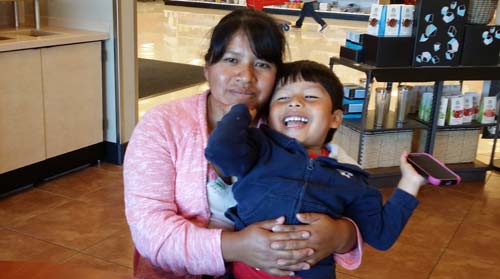by Viji Sundaram
RICHMOND, Calif. – “I once lived in fear, but then I realized I didn’t do anything wrong and I should stop being afraid,” says 36-year-old Tomasa Espinoza.
It’s hard to tell whether Espinoza inspired her husband, Jesus Pérez, or if it was the other way around. But ever since they came to the United States over a decade ago, the two have never hesitated to make their voices heard for causes they believe in.
Neither of them thinks that being undocumented should force them to live in the shadows.
“We didn’t do anything wrong coming here,” Pérez said. “We just want a better life.”
If there’s an immigrants rights rally in Sacramento, you can be sure Espinoza will be there with her team of West Contra Costa County fellow activists. She has taken part in the recent campaign to demand health care for all Californians, regardless of their immigration status. She was also there participating in the “I was not born in California, but California was born in me” rallies.
Far from worrying about having his wife outing herself, Pérez says he is proud of what she does.
“I admire what she does,” he says. “She believes immigrants have rights too, and I support that idea.”
“We are big dreamers and there’s nothing wrong in that,” Espinoza adds, her husband interpreting for her.
Pérez says that he has been driving since he bought a car from the money he’d saved up doing construction jobs, months after coming to the United States. He knew he couldn’t get a driver’s license because he was undocumented, but he also knew that his freelancing gigs required him to be mobile.
“If I let fear overcome me, I wouldn’t be able to feed my family,” says Pérez, who recently got a license under California’s AB 60 law. Under it, any California resident will be able to apply for a driver’s license. The law was passed last year.
Espinoza also required transportation to take her from one office-cleaning job to another, so she got behind the wheel without a license as soon as she learned to drive. The desire to send her three children to a reputed charter school in Richmond and take them to other activities trumped her fear of getting pulled over by a cop. She is now in the process of getting herself a driver’s license under AB 60.
She quit working about seven years ago because she wasn’t making enough to pay for day care for her children. That freed her up to more fully engage herself politically.
But the couple acknowledges that not having documentation limits them in many ways, especially in protecting their own civil rights.
For instance, they would have liked to find out why their former landlord in Richmond evicted them last year without giving them adequate notice. The lawyers they consulted simply told them they couldn’t do much because of their undocumented status. It was this personal experience that now gets Espinoza to Richmond City Council meetings when tenants’ rights are on the agenda.
Both Espinoza and Pérez have Emergency Medi-Cal cards, a benefit undocumented immigrants are eligible for. But it entitles them to only seek treatment for an emergency medical condition and pregnancy-related services.
Espinoza is worried because she was recently diagnosed as pre-diabetic.
“I have three children and I need to stay healthy,” she says. “I am hoping that Senator Lara’s Health for All bill passes.”
They are also hoping that a federal Texas court will allow President Obama’s recent executive action on DAPA (Deferred Action for Parents of Americans) to move forward. The program gives a three-year temporary reprieve from deportation to parents of U.S. citizens or green card holders, parents like Espinoza and Pérez. All three of their children — nine, seven and four years old — were born in the United States.
One of the first things Pérez wants to do after getting DAPA is to open his own construction firm. He is a licensed electrician, plumber and painter. If he does, Espinoza says she would like to work alongside her husband, after acquiring a few skills.
“Why not,” she says, looking at her open palms. “I am strong and I can learn.”



